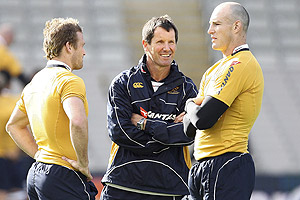
The Chinese have a saying: “For a journey of a thousand miles, it is necessary to make the first step.” In terms of the Wallabies attempt to capture a third Rugby World Cup in 2011, the tour that is starting in Hong Kong on Saturday and then travels on to Padova, Twickenham, Paris, Cardiff and Wembley, is, in sports parlance, the first hard yards to a successful RWC journey.
In the lead-up to the tour, three factors have revealed the thinking of Robbie Deans on the difficult nature of the tour, and in mounting a successful RWC challenge.
First:
Deans tried to prepare for a future frontrow that will not include Matt Dunning and Al Baxter. This is a crucial element in the success of the Wallabies in years to come. Unless a competitive frontrow can be created, Test after Test and not just for the occasional match, the Wallabies will always be vulnerable to losses in one-off, special Tests.
Incidentally, this is a problem that the All Blacks selectors recognise in the Wallabies.
Some rugby people might have wondered at the name Ben Franks in the All Blacks touring squad. Franks is a useful prop for the Crusaders, but not as dynamic as, say, Wayne Crockett, who was not selected. But Franks was born in Australia, and therefore eligible to play for the Wallabies and to undoubtedly strengthen the propping options.
But not now, although he has a younger brother who is also a sound prop.
The All Black selectors, therefore, have effectively warehoused Franks the way Deans has warehoused Quade Cooper (previously eligible for New Zealand) and James O’Connor (eligible for South Africa and New Zealand).
The odd player out in all of this was Kurtley Beale, who is eligible to play for Australia only, for the next three years.
Second:
The policy of the players “playing what is in front of them” foundered during the Test season with the revelation that the players as a group (with the exception of Matt Giteau and George Smith) did not have the skills or rugby nous to make effective decisions on the run.
Third:
As a consequence of this, Deans organised no fewer than four training camps to try and get the playing skills up and the improve the understanding of how to launch counter-attacks to exploit breakdowns in the play of the opposition. I once asked Deans why the Crusaders were so adept and accurate in launching dangerous counter-attacks. He looked at me quizzically, thought about the answer, and said: “I can tell you it doesn’t happen by accident. It takes endless practice.”
The other deficiency with the Wallabies Deans discovered was that they weren’t really fit.
Greg Growden recently pointed out that this Test season the Wallabies scored 24 tries and conceded 25. Of those 25 tries, 15 were scored in the second half, and 10 were scored in the last quarter of the Test.
So much of the work at the four training sessions was brutal fitness stuff.
This full-on training resulted in a list of casualties, including James Horwill, who I believe was being groomed to be the captain of the 2011 RWC campaign.
Deans concedes that his strategy of opting for training camps rather than getting the players to play matches might tell against the Wallabies at Hong Kong where they come up against an All Blacks for whom many of the players have been playing regularly over the last two months.
The other problem with the Hong Kong match, as well as the other Tests, is that it is an away game.
This is true for the All Blacks too. But the All Blacks are much better both currently and historically winning away from home than the Wallabies.
Two factors might work for the Wallabies, however,
The first is that it’s likely to be very hot in Hong Kong. The Wallabies have done most of their training in Sydney under much hotter conditions than in New Zealand.
The second is that the New Zealand players have been playing under a new scrum call of ‘crouch, touch, en-gage!, rather than elongated ‘crouch, touch, pause, en-gage’!
The timing of the All Blacks front row may well be off for most of this Test.
Also, the New Zealand players have been playing under the short-arm sanction for most infringements at the ruck and maul.
Against this is the fact that with more full-arm penalties, Daniel Carter’s longer and more accurate goal-kicking over Stirling Mortlock and Matt Giteau could be an advantage for the All Blacks.
Once the Wallabies get to Europe they will probably encounter cold, slippery and wet conditions. Traditionally, the Wallabies don’t play well in these sorts of conditions.
The Wallabies have had only one unbeaten European tour since the professional era. That was in 1996 when Greg Smith was the coach. It will be a tremendous achievement if Robbie Dean’s team could win all the Tests on this tour.
Being realistic you would think that of the four Tests, an excellent result would be three Test wins out of the four.
And a two out of four wins in the Tests would be at the lowest level of a pass mark result.
All this, of course, is conjecture.
The ‘blood and iron’ creator of modern Germany, Count Otto Bismarck, once wrote in his journal: “He goest furtherest who knows not where he is going.”
For now, therefore, it’s game on for the Wallabies before journey’s end in 2011.





























































































